Reporting Framework
This framework sets out the reporting requirements for signatories to the Sustainable Blue Economy Finance Principles. Access the reporting framework here.
Latest Publications.
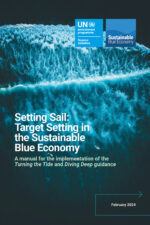
Setting Sail: Target setting in the Sustainable Blue Economy
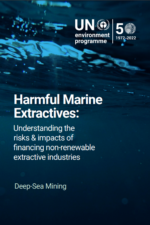
Harmful marine extractives: Deep-Sea Mining
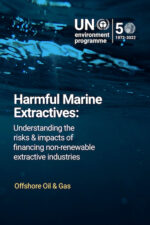
Harmful marine extractives: Offshore Oil & Gas
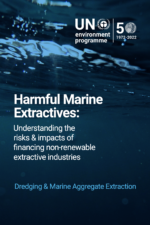
Harmful marine extractives: Dredging & marine aggregate extraction
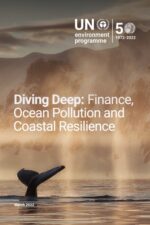
Diving Deep: Finance, Ocean Pollution and Coastal Resilience
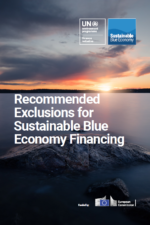
Recommended Exclusions for Financing a Sustainable Blue Economy
View more Blue Finance publications
External resources
Towards a sustainable ocean: Where there’s a will, there’s a wave
Standard Chartered | 2024 | This publication reviews the issue of underinvestment in the ocean. It argues that a range of sustainable finance vehicles are available to mobilise
capital at scale towards the blue economy and that key barriers to investment – such as investor concerns over data availability and lack of clear policy frameworks – are gradually being overcome.
Assessing Financial Flows within the South West Indian Ocean Blue Economy
WWF | 2024 | This report provides an assessment of the financial flows in the South West Indian Ocean region. Among its findings, the report shows that most financiers do not have sufficiently comprehensive ESG policies in place to manage their exposure to ocean-related risks and that there is little regulation to ensure that financial flows into the region are directed towards sustainable and inclusive activities.
Towards a Regenerative Blue Economy
IUCN | 2024 | This publication centers on the various existing terms, definitions, and frameworks pertinent to the blue economy, which includes “sustainable blue economy”, “ocean economy” and “regenerative blue economy”. It provides a detailed review of what audience and context each of these was developed for and proposes using a term focusing on attaining the highest level of sustainability.
How to Lose Half a Trillion
Planet Tracker | 2024 | has published a report assessing the viability of financing deep sea mining activities. Its findings show that preserving the planet’s abyssal plains is worth at the very least ten times more than exploiting them, and that exploiting the deep sea’s resources to mine polymetallic nodules in international waters would destroy USD 30-132 billion of corporate value. The report applauds calling for a moratorium on deep sea mining.
Measuring contributions towards terrestrial and marine biodiversity targets
IUCN | 2024 | This brief focuses on how the Species Threat Abatement and Restoration (STAR) metrics can help all actors, including financial institutions, better plan projects that can bring benefits for threatened species, assess biodiversity-related risks, and align contributions to deliver on the Global Biodiversity Framework.
Unlocking the Potential of the Blue Economy
BlueInvest | 2024 | BlueInvest, funded by the European Union, issued a report intended to complement the BlueInvest Investor Report released in 2023 (which in turn aimed at providing investors with market knowledge on the EU Blue Economy to support their investment decisions). The 2024 report delves into the deals’ landscape for each sector of the blue economy as well as changes in the financial landscape, and features a market study of the 10 priority sectors of BlueInvest.
Sustainable Ocean Principles: Practical guidance – Ports
United Nations Global Compact (UNGC) | 2023 | This guidance document is intended to outline ways to operationalize UNGC’s Sustainable Ocean Principles. Although the primary intended audience of this document are companies operating in the port sector, it may also be used by financial institutions as a due diligence tool and to inform their decisions. This tool has been developed in alignment with UNEP FI’s work, particularly the Diving Deep guidance document.
Bonds to Finance the Sustainable blue economy: A practitioner’s guide
Asian Development Bank (ADB), International Capital Market Association (ICMA), International Finance Corporation (IFC), United Nations Environment Programme Finance Initiative (UNEP FI) and United Nations Global Compact (UNGC) | 2023 | This guidance provides market particpants with clear criteria, practices and examples for ”blue bond” lending and issuances. Gathering input from the financial markets, ocean industry and global institutions, it provides information on the key components involved in launching a credible “blue bond,” how to evaluate the environmental impact of “blue bond” investments; and the steps needed to facilitate transactions that preserve the integrity of the market.
Generating Finance for Blue Economy Transition
Narula, Spalding, Thiele, Dyer, Pouponneau and Chauhan | 2023 | This policy briefing explores how the G20 can catalyse financing for Blue Economy transition by promoting targeted financial instruments such as debt-for-nature swaps, blue bonds and loans, conservation outcome-based financing, and parametric insurance. Key recommendations include adopting robust standards and frameworks; strengthening oversight; eliminating regressive subsidies; deploying innovative financial instruments; implementing cohesive policies and coordinated responses; increasing public investment; de-risking investments; incentivising private finance, and increasing partnerships.
Financing the Blue Economy in Asia
Tameo Impact Fund Solutions and Sasakawa Peace Foundation | 2023 | This report aims to synthesize knowledge about successful labeled blue issuances and qualifying blue projects in the Asian region, with a special focus on gender lens investing to address gaps in equity and equality within the blue economy.
Unlocking the potential of ocean-related data to develop insightful blue metrics for financial institutions
WWF, Green Digital Finance Alliance and Copenhagen Business School | 2023 | This report on blue metrics demonstrates that ocean-related data can be further integrated to assess the environmental impact of investments exposed to marine ecosystems and used to inform financial decisions and practices. It is a result of the Making Oceans Count Initiative, which aims to have material marine ecosystem-related risks and opportunities better accounted for by key actors within the Nordic financial sector. The initiative demonstrates that more can be done to assess ocean-related risks and impacts, including geolocated exposure to sensitive marine areas, by combining environmental data, with geolocated asset-level data, pressure estimation data and financial ownership data.
Investor Report: An Ocean of Opportunities
European Commission | 2023 | This investor report provides investors with an overview of investment activities and opportunities in the EU blue economy. It also features the key innovative technologies and a sample of investment-ready companies across 10 sectors of the sustainable blue economy from the BlueInvest pipeline.
High-Quality Blue Carbon Principles and Guidance
Conservation International, Friends of Ocean Action, WEF, ORRAA, SalesForce, The Nature Conservancy and Meridian Institute | 2022 | Coastal ecosystems like mangrove forests, tidal marshes, and seagrass meadows sequester and store vast amounts of carbon and are now being recognized for their role in mitigating climate change. Growing demand for blue carbon credits and the accompanying surge of interest in blue carbon have attracted many new actors into this space. This publication sets principles and guidelines that outline what high-quality blue carbon projects and credit development mean.
Policy Briefing: Financing the Sustainable Blue Economy
WWF and UNEP FI | 2022 | In light of the G20 that took place in Indonesia in November 2022, Louise Heaps (WWF), Dennis Fritsch and Karla Martínez Toral (UNEP FI) have collaborated on a policy briefing addressed to public actors that lists a series of policy recommendations to support the transition towards a sustainable blue economy.
Guidelines for Blue Finance
IFC | 2022 | This document identifies eligible blue project categories to guide IFC’s investments to support the blue economy, in line with the Green Bond Principles and Green Loan Principles. The market has been seeking guidance on project eligibility criteria, translating general Blue Economy Financing Principles, such as the Sustainable Blue Economy Principles and the Sustainable Ocean
Principles, towards guidelines for blue bond issuances and blue lending.
Blue Growth and Blue Justice
Bennet et al., UBCOceans| 2020 | This paper reviews past evidence of the social injustices that can result from ocean-based development and highlights 10 injustices that can be produced by blue growth. It concludes that a commitment to ‘blue justice’ – including recognitional, procedural, and distributional concerns – needs to be at the core of the blue growth agenda.
Towards a sustainable and equitable blue economy
Bennet et al., Nature Sustainability| 2019 | The global rush to develop the ‘blue economy’ risks harming both the marine environment and human wellbeing. Bold policies and actions are urgently needed. This paper identifies five priorities to chart a course towards an environmentally sustainable and socially equitable blue economy.
Value at Risk
WWF| 2021 | This ground breaking research shows that a business-as-usual trajectory entails great risk to our economies, with a cost potentially reaching up to US$8.4 trillion over the next 15 years. But the ocean also has a great capacity to regenerate. If we take immediate action, we can reduce this damage to US$3.3 trillion. By repairing damage to the ocean, we revive one of the world’s greatest resources and one of the world’s largest carbon sinks.
Blueprint for a Climate-Smart Ocean to Meet 1.5°C
United Nations Global Compact| 2021 |This Blueprint lays out six key steps to unlock a climate-smart ocean to meet 1.5°C, from innovative ocean management and human-centred policies, to harnessing blue finance and leveraging the ocean-climate nexus in political processes. The blueprint is the outcome of the UN Global Compact Blue Road to COP 26 multi-stakeholder workstream.
Sovereign Blue Bonds: Quick Start Guide
ADB| 2021 | ADB published a comprehensive guide to developing green bonds that is also suitable for blue bonds. This quick start guide highlights frequently asked questions and provides a summarized look at pre-feasibility and first steps to develop a sovereign blue bond.
Proposing a regulatory-driven blue finance mechanism for blue economy development
ADBInstitute | 2020 | This paper provides a conceptual understanding of the concept of blue finance and explores the potential of using legal and institutional mechanisms to increase investment in ocean development programs.
Financing a sustainable ocean economy
Sumaila et al. | 2021 | This paper identifies the key barriers to financing a sustainable ocean economy and suggests how to mitigate them, to incentivize the kind of public and private investments needed for topnotch science and management in support of a sustainable blue economy.
Blueprint for a living planet: Four Principles for Integrated Ocean-Climate Strategies
WWF| 2021 | This report proposes four principles to guide integrated ocean and climate action to strengthen the mitigation, adaptation and resilience potential of marine and coastal ecosystems – and everything and everyone that depends on them. It offers practical guidance to countries and partners on how to effectively address ocean and climate ambition and action in a synergistic manner.
The Second World Ocean Assessment
UN | 2021 | The Second World Ocean Assessment is the major output of the second cycle of the Regular Process for Global Reporting and Assessment of the States of the Marine Environment, including Socioeconomic Aspects. It is the newest outcome of the only integrated assessment of the world’s ocean at the global level covering environmental, economic and social aspects.
Unpacking the UNFCCC Global Stocktake for Ocean-Climate Action
IUCN | 2021 | This paper provides a broader understanding of the crucial interlinkages of the whole ocean as part of the climate system and the role of ocean, coastal and marine Nature-based Solutions as part of The Global Stocktake set out by the Paris Agreement. It explores the Global Stocktake as an avenue for information and raising the ambition of countries’ Nationally Determined Contributions in relation to ocean ecosystems and climate change.
New approach for a sustainable blue economy in the EU
EU | 2021 | The European Green Deal and the Recovery Plan for Europe will define the European economy for many years, or even decades. It is hence fundamental that the EU’s blue economy meets the EU’s environmental and climate objectives. To fully embed the blue economy into the Green Deal and the recovery strategy, the Commission has adopted a new approach for a sustainable blue economy, covering oceans, seas and coasts in the EU.
Sustainability criteria for the blue economy
EU | 2021 | The need to develop and promote sustainable blue economy activities has become critical. It is necessary to develop a common understanding of the activities and practices that contribute to it at international level. This study is a contribution towards the establishment of such a common understanding by developing a set of criteria to assess the sustainability of blue economy activities.
Ocean Finance: Financing the Transition to a Sustainable Ocean Economy
High Level Panel for A Sustainable Ocean Economy | 2020 | Overview of the current ocean economy and the multiple stressors and how ocean finance can aid in changing this trajectory. Explains the barriers and opportunities in financing and how more investment is needed to transition to a sustainable ocean economy.
Unsustainable Finance in the Blue Economy: Where Does the Money Come From?
EU | 2020 | How to shift investment towards sustainable oceans this report includes insights and recommendations for policymakers and investors. Published by the European Commission, this is a must-read for investors dealing with the blue economy.
Investors and the Blue Economy
Fritsch, D | 2020 | This high-impact research project measures investor interest in ocean-related investments, and opportunities around the sustainable Blue Economy. Surveying leading global investors on the ‘investability’ of ocean-related sectors, the research provides unique insight into the present and future state of investor action on SDG 14.
The EU Blue Economy Report 2020
European Commission | 2020 | The report highlights the need to preserve marine ecosystems to optimise potential benefits of ecosystem services and marine and maritime economic sectors.
The Ocean Finance Handbook
Friends of Ocean Action | 2020 | A guide that seeks to demystify the investment landscape of the sustainable blue economy.
A sustainable Ocean Economy in 2030: Opportunities and Challenges
The Economist Group | 2020 | In this report, The Economist Group’s World Ocean Initiative assesses the challenges facing key sectors in the ocean economy including seafood, shipping, tourism and renewable energy.
The State of World Fisheries and Aquaculture 2020
UN FAO | 2020 | This report provides technical insight and factual information on the fisheries & aquaculture sector, highlights major trends and emerging areas relevant to sustainable development.
Can Blue Bonds Finance a fish stock recovery?
Planet Tracker | 2020 | It is clear that ocean fishing is on an unsustainable course of rising demand and falling supply but could recover if the reset button is pushed. Restrictions on catch, along with a proper debt financing vehicle, would assist in creating a financially viable transition scenario to sustainable oceans. A blue bond provides a more profitable route than the business-as-usual scenario, over the long-term.
Fishful Thinking: Solving China’s Distant-Water Challenges
Planet Tracker | 2024 | This report discusses the exposure to environmental and social harm to which many financial institutions are exposed (via food producers and food retailers) because of China’s distant-water fleet. This report analyses how actors, including financial institutions, can help turn the status quo and make this fleet sustainable.
2024 Seafood Stewardship Index Insights Report
World Benchmarking Alliance | 2024 | Sharing learning on 30 influential seafood companies with the power to create a more sustainable future, the Seafood Stewardship Index Insights Report delves into the patterns of corporate performance (across governance, traceability, ecosystem impacts and social responsibility). The report shows an increase in disclosure of sustainability practices, and in engagement with certification and pre-competitive collaborations. However, progress overall is limited by a lack of comprehensive, ambitious targets, and slow progress on issues of human-rights and illegal fishing.
2023 Above Board: Banks’ Seafood Sector Policy Analysis
WWF | 2024 | This report focuses on whether and, if so, how banks are improving the way they manage environmental and social risks in their seafood portfolios. Among its findings, this 2023 assessment found that an increasing number of banks are taking action to manage E&S risks related to nature loss, climate change and human rights issues in the seafood sector, with nine banks (out of 40 banks assessed) demonstrating improvements against 2022’s baseline.
2024 Seafood Stewardship Index Insights Report
World Benchmarking Alliance | 2024 | Sharing learning on 30 influential seafood companies with the power to create a more sustainable future, the Seafood Stewardship Index Insights Report delves into the patterns of corporate performance (across governance, traceability, ecosystem impacts and social responsibility). The report shows an increase in disclosure of sustainability practices, and in engagement with certification and pre-competitive collaborations. However, progress overall is limited by a lack of comprehensive, ambitious targets, and slow progress on issues of human-rights and illegal fishing.
2023 Seafood Stewardship Index
World Benchmarking Alliance | 2023 | The Seafood Stewardship Index ranks the sustainability performance of the world’s 30 most influential companies in the seafood industry, representing about a quarter of the world’s global seafood industry revenue. The 2023 Seafood Stewardship Index, released on October 17th, shows that even though progress is being made by a few leaders, most of the companies assessed still fail to demonstrate meaningful efforts to address their social and environmental impacts.
Legal risks related to biodiversity loss in the seafood and agriculture sectors
ClientEarth | 2023 | This report looks at the potential legal and litigation risks associated with biodiversity impacts and dependencies for the seafood and agriculture sectors. It provides an overview of applicable laws that may give rise to legal liabilities associated with biodiversity loss, and offers concrete steps to mitigate the risks. It further looks into impacts and dependencies give rise to financial risks for companies and financial institutions that may trigger corporate and financial law duties.
Avoiding Aquafailure: Aquaculture diversification and regeneration are needed to feed the world
Planet Tracker | 2023 | As seafood demand continues to grow and unsustainable practices related to seafood production continue to exist, fish stock and marine biodiversity are being put under increasing pressure. Technological responses to mitigate this crisis are emerging, but to meet the rising demand and reduce environmental impacts, change is necessary. Since feed is by far the largest cost in aquaculture production, one solution is to concentrate on expanding the production of seafood that does not require feed, such as bivalves (e.g. oysters) and seaweed. Their production can even contribute to regenerating ecosystems, through the natural ecosystem services they provide like water filtering, carbon sequestration and habitat provision. These forms of regenerative aquaculture are positioned to produce an additional 45 million tonnes of seafood capable of feeding a global population of 9.7 billion. Read more about this opportunity and how it related to investments in this report.
Building the Business Case for Seafood Finance
WWF | 2023 | Supporting financial institutions’ operations align with sustainable blue finance, WWF has developed shareable slide decks regarding finance and: (i) The Business Case for Addressing Seafood Sector Risk in Financial Markets; (ii) Overfishing and Endangered Species; (iii) Deforestation and Conversion Impacts; (iv) Seafood Certification & Improvement Pathways; (v) Illegality and Human Rights Abuses in Seafood; (vi) Seafood Traceability and Transparency. These resources are free to use and should help inform financial decision-makers on seafood-related financial risks and business case.
Above Board: 2022 Baseline Assessment of Banks’ Seafood Sector Policies
WWF | 2023 | This assessment shows that while many banks are aware of the need to manage E&S risks in the sector, current policies – where they exist – are insufficient to prevent and/or manage their exposure to significant reputational, market and regulatory risks related to the seafood industry. This report highlights key findings from the assessment conducted, provides actionable recommendations for banks, and directs readers to practical resources to guide next steps. An annual progress update is planned for publication in 2024.
Getting Underway: 2022 Baseline assessment of asset managers’ approaches to addressing environmental and social risks in seafood-related investments
WWF | 2023 | WWF conducted a baseline assessment of 42 asset managers’ public disclosures to understand how asset managers are currently managing nature-related risks in their seafood portfolios, and where, specifically, additional support may be most needed. WWF developed expectation-related indicators that align to the Diving Deep guidance developed by UNEP FI. The analysis shows that seafood-related risks and impacts are not, in the vast majority of cases, being addressed by asset managers.
OECD Review of Fisheries
OECD | 2022 | This Review assesses the health and productivity of fish stocks and explores how they can be better managed. It updates and analyses the OECD Fisheries Support Estimate, a collection of country-level data on governments support to fisheries, covering both subsidies and services to the sector in OECD countries and other major fishing nations.
How to Trace $600 Billion: Traceability Could Add 60% to Global Seafood Profits
Planet Tracker | 2022 | A 1% investment of the global seafood industry’s revenue into traceability could unlock a USD 600 billion-dollar boost in global seafood enterprise valuations and increase total profitability by 60%.
Seafood Stewardship Index
World Benchmarking Alliance | 2021 | The Seafood Stewardship Index is publicly available and measures the world’s 30 most influence companies in the seafood industry on their contribution to the UN Sustainable Development Goals. The Index assesses companies across four measurements areas: Governance and Strategy, Ecosystems, Social Responsibility and Traceability and IUU.
Do you IUU?
Planet Tracker| 2021 | This report presents an actionable toolkit to asses to risk of actionable Illegal, Unreported and Unregulated (IUU) fishing in investors’ portfolios.
Planet Tracker IUU Fishing Detection Toolkit
Planet Tracker| 2021 | To help investors assess the risk of IUU fishing by listed entities, Planet Tracker provides an IUU Detection Toolkit which allows investors to check for potential IUU red flags. The online interactive toolkit helps investors compute an IUU score for any listed fishing company.
Environmental performance of blue foods
Gephart et al., Nature | 2021 | Fish and other aquatic foods (blue foods) present an opportunity for more sustainable diets. Yet comprehensive comparison has been limited due to sparse inclusion of blue foods in environmental impact studies, relative to the vast diversity of production. This paper provides standardized estimates of greenhouse gas, nitrogen, phosphorus, freshwater and land stressors for species groups covering nearly three quarters of global production.
The State of World Fisheries and Aquaculture 2020
UN FAO | 2020 | This report provides technical insight and factual information on the fisheries & aquaculture sector, highlights major trends and emerging areas relevant to sustainable development.
Seafood and Fish Tracker Initiative
Planet Tracker’s Seafood Tracker Initiative investigates the impact that financial institutions have in financing global wild-catch fisheries and seafood trade. Includes insightful reports on blue bonds finance, global aquaculture market trends and innovative sustainable finance solutions.
Leverage points in the financial sector for seafood sustainability
Jouffray et al., Science Advances | 2019 | Can finance contribute to seafood sustainability? As more capital enters the seafood industry, this report identifies three leverage points to redirect capital toward more sustainable practices; loan covenants, stock exchange listing rules, and shareholder activism.
Tobacco-Free Finance Pledge
UNEP FI | 2019 | Cigarette butts are one of the largest contributors to ocean pollution, causing irreversible damage to ocean wildlife. Sign the pledge and join leading financial institutions to implement tobacco-free finance policies and encourage other institutions to follow suit.
Sustainable Seafood and Responsible Investment
Aviva Investors, Sustainable Fisheries Partnership & PRI | 2018 | Looking across both wild caught and farmed fish, this report looks at why investors in the seafood businesses need to consider sustainability issues.
Empty Nets – How overfishing risks leaving investors stranded
Fish Tracker Initiative | 2017 | Identifies 228 companies listed on the world’s stock markets with exposure to seafood production. This begins the process of linking overfishing with the companies’ revenue exposure and how they are managing key risks, such as overfishing.
Blue Thread: Aligning National Climate and Biodiversity Strategies
Ocean & Climate Platform and Blue Marine Foundation | 2024 | This report highlights the need to integrate climate and biodiversity action (particularly considering the Convention on Biological Diversity and the Paris Agreement) because of their complementary nature. It identifies ocean-based solutions as ideal to enhance such synergies and integrated implementation, weaving a “blue thread” between nature and climate plans. It identifies ways to increase and improve climate and nature finance architectures (notably in a way that integrates the ocean).
International policy framework for blue carbon ecosystems
Conservation International and IUCN | 2023 | This policy framework provides an overview of the intersections and opportunities for blue carbon ecosystem conservation and restoration in the relevant international policy processes.
The Blue Carbon Handbook
High Level Panel for a Sustainable Ocean Economy | 2023 | This report aims to advance action and understanding of blue carbon actions and their cross-cutting benefits that contribute to sustainable development and protecting biodiversity, in addition to climate adaptation and mitigation. It provides insights and recommendations on effectively implementing blue carbon projects at the national and local levels, ensuring that they are of high quality and have high environmental and social integrity, thus serving as a valuable resource for governments, local communities and other stakeholders across sectors.
Financing Nature-based Solutions for Coastal Protection
IUCN NL & Wolfs Company| 2022 | This market study explores blended finance mechanisms with carbon credits for financing nature-based solutions projects. It reviews the financing landscape for nature-based solutions, the risks associated with setting up projects, and the relevant stakeholders that invest in projects with blended finance models, providing practical guidelines on how to develop a business model for nature-based coastal protection projects.
Coastal Risk Index
AXA XL Ocean Risk Initative | 2021 | The Coastal Risk Index (CRI) provides an innovative, interactive tool that allows users to assess coastal flood hazard and quantify the potential risk reduction benefits of marine ecosystems for coastal communities, national, regional and city planners, investors, risk managers, insurers and more. It models coastal flooding at different levels of severity in current conditions and projected to 2030 and 2050.
Reducing Caribbean Risk: Opportunities for Cost-Effective Mangrove Restoration and Insurance
The Nature Conservancy | 2021 | Explains the important role insurance companies play in coastal protection. Mangrove forests can help dissipate wave energy and lower flood risk. Mangroves are under threat from man-made factors and insurance can provide a unique market-based mechanism that can cost-effectively protect and restore these coastal habitats.
Insurance for Natural Infrastructure: Assessing the Feasibility of Insuring Coral Reefs in Florida and Hawaii
The Nature Conservancy | 2020 | A case of natural infrastructure in Florida and Hawai’i. Natural infrastructure like mangroves and coral reefs can reduce storm surge heights and aid in mitigating natural disasters. Parametric insurance can help provide a new source of funds to support post-event reef repair to support coastal risk reduction.
Investments in Coastal Nature-based Solutions: Opportunities for National and Local Governments
Von Unger, M., Castillo Cartin, G. | 2022 | This paper provides a cursory overview of the topical challenges regarding Nature-bases Solutions, and explores options for addressing them. It highlights how investments from both the public and private sectors can be combined to promote and enable sustainable growth and to strengthen mitigation and adaptation capacity and action. Its findings show that success depends on an adequate interaction among stakeholders, the careful gauging of synergies between investment, environment and climate protection, and the mainstreaming of policy areas including tax, trade, planning and labour policies.
Podcasts
Restoring ocean health through finance
Dennis Fritsch, former Sustainable Blue Finance Lead at UNEP FI and Dorothee Herr, Oceans & Climate Change Manager at IUCN discuss ocean health, its role in regulating the global climate, its economic value and the role that financial institutions can play in restoring this vital ecosystem. In this compelling conversation, they also introduce us to UNEP FI’s Sustainable Blue Economy Finance Principles and IUCN’s Blue Natural Capital Financing Facility, helping financial institutions and project developers take part in a sustainable blue economy. Listen to podcast here.
Financing a just transition to a sustainable economy
Including social equity considerations in investment decisions and processes is critical for the blue economy to deliver its full potential in addressing global challenges. In this episode, we look at the human dimension of the sustainable blue economy, focusing on the role of financial actors. Five experts from the academic, NGO and finance communities join the conversation, giving insights on how organisations can finance a blue economy that is sustainable, economically viable, and socially equitable. Listen to the podcast here.
